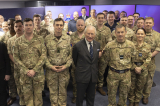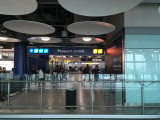UK News
-
 King Charles III visits Northwood HQ, praising 24/7 military operations protecting the UK and allies
King Charles III has visited Northwood Headquarters for the first time as monarch, paying tribute to the men and women whose round-the-clock work underpins the security of the UnitedRead More...
King Charles III visits Northwood HQ, praising 24/7 military operations protecting the UK and allies
King Charles III has visited Northwood Headquarters for the first time as monarch, paying tribute to the men and women whose round-the-clock work underpins the security of the UnitedRead More... -
 Forestry England to unlock public forests for clean energy in boost to UK renewables
England’s public forests are set to play a much bigger role in powering the country with home-grown clean energy, after new statutory powers came into force on Friday 27 February.Read More...
Forestry England to unlock public forests for clean energy in boost to UK renewables
England’s public forests are set to play a much bigger role in powering the country with home-grown clean energy, after new statutory powers came into force on Friday 27 February.Read More... -
 New DLR trains set to return to service by late summer after safety upgrades
New Docklands Light Railway (DLR) trains are expected to return to customer service by late summer, following months of intensive testing, investigation and safetyRead More...
New DLR trains set to return to service by late summer after safety upgrades
New Docklands Light Railway (DLR) trains are expected to return to customer service by late summer, following months of intensive testing, investigation and safetyRead More... -
 London Growth Plan: Mayor Sadiq Khan calls on government to back businesses as city marks year of economic progress
London leaders say the capital is delivering growth, jobs and regeneration – but warn that businesses need stronger government backing to keep momentum going.Read More...
London Growth Plan: Mayor Sadiq Khan calls on government to back businesses as city marks year of economic progress
London leaders say the capital is delivering growth, jobs and regeneration – but warn that businesses need stronger government backing to keep momentum going.Read More... -
 UK work visa issuance drops 19% in 2025 as tighter immigration rules bite
Work visa approvals in the United Kingdom fell sharply in 2025, underscoring the impact of stricter immigration policies as the government seeks to curb legalRead More...
UK work visa issuance drops 19% in 2025 as tighter immigration rules bite
Work visa approvals in the United Kingdom fell sharply in 2025, underscoring the impact of stricter immigration policies as the government seeks to curb legalRead More...

Culture
-
 Emery Walker revealed: new exhibition explores the man behind the arts and crafts legend
A new exhibition opening this spring at Emery Walker’s House sets out to restore depth, warmth, and personality to one of Britain’s most influential yetRead More...
Emery Walker revealed: new exhibition explores the man behind the arts and crafts legend
A new exhibition opening this spring at Emery Walker’s House sets out to restore depth, warmth, and personality to one of Britain’s most influential yetRead More... -
 London confirms St Patrick’s Day 2026 parade and Trafalgar Square festival
London will turn green once again next spring after the Mayor confirmed the capital’s St Patrick’s Day celebrations will take place on Sunday 15 March 2026, with aRead More...
London confirms St Patrick’s Day 2026 parade and Trafalgar Square festival
London will turn green once again next spring after the Mayor confirmed the capital’s St Patrick’s Day celebrations will take place on Sunday 15 March 2026, with aRead More... -
 Masterpieces beyond the Museum: National Gallery brings life-size art to communities ccross the UK
World-famous paintings from the National Gallery are stepping out of Trafalgar Square and into everyday life, as part of a major touring project that will seeRead More...
Masterpieces beyond the Museum: National Gallery brings life-size art to communities ccross the UK
World-famous paintings from the National Gallery are stepping out of Trafalgar Square and into everyday life, as part of a major touring project that will seeRead More... -
 Award-winning Polish writer Mariusz Szczygieł brings ‘Not There’ essay collection on UK tour
Polish writer Mariusz Szczygieł, one of Central Europe’s most acclaimed literary reporters, will tour the UK later this month with a series of public events marking the English-language release...Read More...
Award-winning Polish writer Mariusz Szczygieł brings ‘Not There’ essay collection on UK tour
Polish writer Mariusz Szczygieł, one of Central Europe’s most acclaimed literary reporters, will tour the UK later this month with a series of public events marking the English-language release...Read More... -
 Professor Dame Carol Black GBE reappointed as Chair of the British Library for 2026–2027
The UK Secretary of State has confirmed the extension of Professor Dame Carol Black GBE as Chair of the British Library, continuing her leadership from 1 September 2026 to 31 August 2027.Read More...
Professor Dame Carol Black GBE reappointed as Chair of the British Library for 2026–2027
The UK Secretary of State has confirmed the extension of Professor Dame Carol Black GBE as Chair of the British Library, continuing her leadership from 1 September 2026 to 31 August 2027.Read More... -
 Climate, community and care: Soma Surovi Jannat’s landmark exhibition at the Ashmolean Museum
From spring through autumn 2026, the Ashmolean Museum presents 'Soma Surovi Jannat: Climate Culture Care', a powerful new exhibition that places climateRead More...
Climate, community and care: Soma Surovi Jannat’s landmark exhibition at the Ashmolean Museum
From spring through autumn 2026, the Ashmolean Museum presents 'Soma Surovi Jannat: Climate Culture Care', a powerful new exhibition that places climateRead More... -
 Londoners on trial: 700 years of crime revealed in a free City archives exhibition
From medieval pickpockets to notorious Victorian figures, seven centuries of crime, punishment and public fascination are laid bare in a new exhibition atRead More...
Londoners on trial: 700 years of crime revealed in a free City archives exhibition
From medieval pickpockets to notorious Victorian figures, seven centuries of crime, punishment and public fascination are laid bare in a new exhibition atRead More... -
 Lost for centuries, Henry VIII’s golden love pendant finds a home at the British Museum
A golden heart pendant once symbolizing the doomed marriage of Henry VIII and Katherine of Aragon has finally been secured for permanent display at the BritishRead More...
Lost for centuries, Henry VIII’s golden love pendant finds a home at the British Museum
A golden heart pendant once symbolizing the doomed marriage of Henry VIII and Katherine of Aragon has finally been secured for permanent display at the BritishRead More... -
 British High Commission hosts Caledonian Ball in Lahore to celebrate growing Scotland–Pakistan partnership
The British High Commission brought a touch of Scotland to Lahore this week as it hosted the Caledonian Ball at the historic Sir Ganga Ram Residence, celebratingRead More...
British High Commission hosts Caledonian Ball in Lahore to celebrate growing Scotland–Pakistan partnership
The British High Commission brought a touch of Scotland to Lahore this week as it hosted the Caledonian Ball at the historic Sir Ganga Ram Residence, celebratingRead More... -
 300-year-old Rysbrack Marble putti blocked from export as UK scrambles to save national treasure
A three-century-old marble sculpture by renowned eighteenth-century sculptor Michael Rysbrack has been placed under a temporary UK export ban, giving BritishRead More...
300-year-old Rysbrack Marble putti blocked from export as UK scrambles to save national treasure
A three-century-old marble sculpture by renowned eighteenth-century sculptor Michael Rysbrack has been placed under a temporary UK export ban, giving BritishRead More... -
 Inside ICG PR: how an international PR agency shapes reputation for luxury, fashion, and cultural brands
Interview: the co-founder of Iris Consulting Group Iryna Kotlyarevska on building global visibility with cultural intelligenceRead More...
Inside ICG PR: how an international PR agency shapes reputation for luxury, fashion, and cultural brands
Interview: the co-founder of Iris Consulting Group Iryna Kotlyarevska on building global visibility with cultural intelligenceRead More... -
 London Zoo’s giraffes take centre stage in New London Underground poster celebrating 200 years of ZSL
London Zoo’s iconic giraffes have stepped into the spotlight with the launch of a striking new London Underground poster, marking the start of ZSL’s 200th anniversaryRead More...
London Zoo’s giraffes take centre stage in New London Underground poster celebrating 200 years of ZSL
London Zoo’s iconic giraffes have stepped into the spotlight with the launch of a striking new London Underground poster, marking the start of ZSL’s 200th anniversaryRead More...

British Queen celebrates
Most Read
- Teen held after US woman killed in London stabbings
- Heave-ho Harry! Prince prepares to join the walking wounded in ice trek to North Pole
- Football: Farhad Moshiri adamant Everton deal above board
- "Master of English Style". Interview with Designer Lydia Dart
- Letter to the Financial Times from Lord Mayor Alderman Michael Bear
World News

Coronavirus misinformation spread by Russian and Chinese journalists is finding a bigger audience on social media in France and Germany than content from the European nations' own premier

British rock legends The Rolling Stones have threatened legal action against Donald Trump for the US president's use of their song "You Can't Always Get What You Want" at campaign rallies.

French trader and specialist oil hedge fund manager Pierre Andurand saw it coming from early February.

When Timo Werner seals his imminent move from RB Leipzig to Chelsea, the German's turbulent rise from national pariah to one of Europe's most feared forwards will be

Surrey have praised the "passion and loyalty" of British cricket fans after revealing 85 percent of seat-holders for what should have been this week's first Test between England and the West

Aston Martin chief executive Andy Palmer has left James Bond's favourite carmaker as it seeks to recover from crashing demand and ballooning losses, the company said Tuesday.

Leading British supermarket chains have warned Brazil they may be forced to boycott its goods if lawmakers in the South American country pass a bill that would "encourage further land

A half-trillion-euro European fund laid out by France and Germany sparked optimism Monday about fighting economic fallout from the coronavirus, as did encouraging early results on vaccine

Wearing a mask and a vest-top, Helder Canto grips the sheep firmly as he begins to shear off its heavy coat, his expertise bringing him on a more than 10,000-kilometre journey from Uruguay

Wheely, a Russian ride-hailing service that offers luxury vehicle services, refused to comply with the traffic safety requirements in Moscow. Anton Chirkunov, the CEO and founder at Wheely,




















